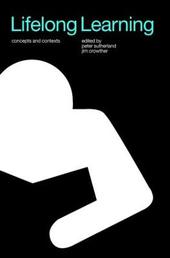
|
Lifelong Learning: Concepts and Contexts
Paperback
Main Details
| Title |
Lifelong Learning: Concepts and Contexts
|
| Authors and Contributors |
Edited by Jim Crowther
|
|
Edited by Peter Sutherland
|
| Physical Properties |
| Format:Paperback | | Pages:264 | | Dimensions(mm): Height 234,Width 156 |
|
| ISBN/Barcode |
9780415443050
|
| Classifications | Dewey:374 |
|---|
| Audience | | Undergraduate | | Postgraduate, Research & Scholarly | | Professional & Vocational | |
|---|
| Illustrations |
14 black & white tables, 4 black & white line drawings
|
|
Publishing Details |
| Publisher |
Taylor & Francis Ltd
|
| Imprint |
Routledge
|
| Publication Date |
5 July 2007 |
| Publication Country |
United Kingdom
|
Description
Lifelong learning has developed enormously as a distinct area of study within education in recent years not least because numerous governments and educational strategists have become very vocal supporters of new ways of learning throughout all stages of life. This guide to the topic brings together new writing from some of the leading thinkers in the field to offer a broad ranging and detailed snapshot of the position to date. The book provides a critical summary of current developments in understanding adult learning and the social context in which they are located. This provides a background for the framing of issues and the problems that emerge in institutional and non-formal contexts of lifelong learning. Students undertaking courses of study in this area as well as a wide range of undergraduate and postgraduate students in a variety of professional areas will find the material essential reading.
Reviews'Sutherland and Crowther's volume largely succeeds in placing itself in current political and educational developments by inviting a range of well-known and new authors to contribute to the volume... All of those involved in lifelong learning, however defined, will want to get hold of a copy of this book.' --Journal of Adult and Continuing Education "This thoughtful and carefully organized collection of essays can serve as a text for university students of lifelong learning to explore both philosophical underpinnings of lifelong learning and its realities in everday life. It is also valuable to those of us who practice daily in the domain of lifelong learning, inspiring us to lift our heads from the technical rationality of planning, organizing, and delivering programs to reflect on our goals and methods, to recognize the paradoxes that shape our work, and to revitalize our dreams of a better world."--Linda MacDonald, Canadian Journal of University Continuing Education (Spring 2009), Vol. 35, No. 1: 63-66
|